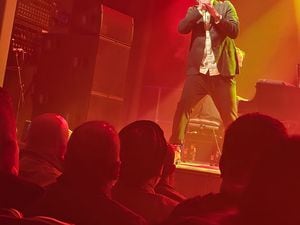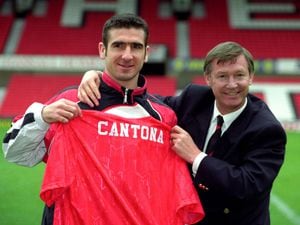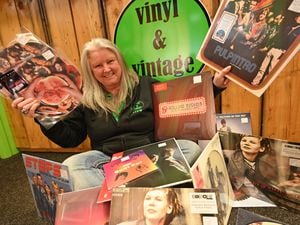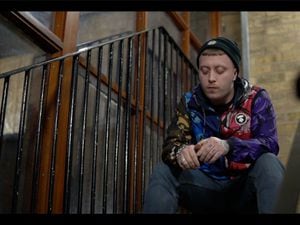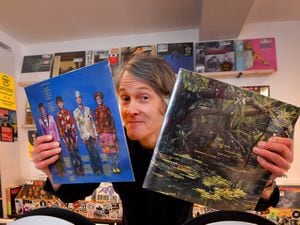Soft Cell delighted to be back together and back on the road
They’ve sold more than 10 million records worldwide and their 1981 hit, Tainted Love, has become an icon. Soft Cell’s Marc Almond and Dave Ball were totemic figures during the late 1970s and early 1980s as they enjoyed a platinum-selling debut album, Non-Stop Erotic Cabaret.
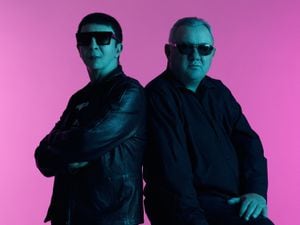
Tainted Love was a number one while Torch, Say Hello Wave Goodbye, What and Bedsitter also became top four records. The duo split in 1984, though reformed in 2001 to tour and release a new album before reuniting again in 2018. And now they’re back again. Soft Cell will play a handful of dates this November, at which their classic album will be performed in full.
The nearest performance to the West Midlands is at Manchester's O2 Apollo on November 12, but Marc Almond says he hasn't forgotten our region – he'll be at Birmingham's Symphony Hall for a solo date on April 7 next year as part of his own European tour postponed from last year. He also appeared at Shrewsbury's Let's Rock 80s festival at the Quarry in August, an event he described as a fantastic return to live performance in front of an audience.
Almond and Ball are both looking forward to the autumn shows.
Almond says: “We plan to do two sets in the evening. The first set will be greatest hits, some album and fan favourites as well as previewing some new songs live for the first time. The second set will be Non Stop Erotic Cabaret in its entirety and in track order with accompanying visuals and a few extras at the end. It’ll be a full-on and exciting show.”
There’s been a quantum leap since their early days on the road in the 1980s. Whole generations have grown up enthralled to their music, which has inspired artists as diverse as David Gray and Nine Inch Nails. They acknowledge the differences in staging live shows now, more than 40 years on from earlier gigs.
Almond says: “We have better technology available now and a richer catalogue of songs that have a history and an audience that has grown with the catalogue. We’re able to explore the visual side a lot more and have more experience as musicians and performers.”

Ball adds: “The main difference in the 21st Century is the technology. All our visuals, lights and sequenced synths & drum machines are run live from offstage computers as opposed to the old Kodak projectors & Revox reel to reel tape machines we used to use on stage.
"It makes changing around set running orders a lot easier and gives us much more control and clarity in the sound and visuals.
"I still play live analogue synths on stage and we certainly don’t use autotune on Marc’s or the backing singer’s voices. One thing that hasn’t changed is Gary Barnacle still plays a mean saxophone.”
Non-Stop Erotic Cabaret was a sensation. Released on November 27 1981, it featured a cover of Gloria Jones’s song Tainted Love, which became the best-selling British single of 1981. In the USA, the album enjoyed pre-orders of 200,000, based on the single’s success.
Almond is incredulous that so much time has passed. “If I sit back and think about its hard to believe that a small collection of songs has had such a long life, that people still listen to and enjoy it. I’m amazed at how fresh and current it still sounds – and lyrically still relevant. It doesn't feel like it’s 40 years old at all – but it scares me a bit to think that it is.”
Ball feels the same: “What surprises me is how fresh Non-Stop Erotic Cabaret still sounds today. I suppose we were both 40 years younger so Marc’s voice sounds more youthful and not so polished as now and my synth playing and arrangements were more simplistic, although I’ve always tried to stick with my minimalist style.”
Recording the album was a challenge. Ball says: “The funniest things that happened during the recording of the Non Stop Erotic Cabaret album probably didn’t happen in the studio, but usually when we were out partying in New York. We were usually very conscientious in the studio under the watchful eye of our producer, Mike Thorne, so we never usually took anything stronger than coffee when working – we saved that for the evenings when the chaos would usually commence.”

Soft Cell were a product of their time. The duo hailed from the North, around Leeds, and they first met at the city’s Polytechnic in 1977. Their initial efforts at recording resulted in the EP, Mutant Moments.
Almond says: “I think being born in Lancashire in seaside towns gives you a Vaudevillian sensibility. It's the home of cheap showbiz and hard bitten entertainers, lurid cabarets, casinos and pier shows. Seaside postcards, Coronation Street and The Beatles. Being born in the North gives you a tough survival instinct and the humour to deal with it. We definitely needed it with Soft Cell in the early days because we were treated by some quarters as the cheap seaside sideshow poor Northerners.”
Ball agrees: “We are both originally from The North – Marc from Southport, me from Blackpool. I think our ‘northern grit’ was our sheer determination to be successful, against all odds. We probably wouldn’t have passed the audition stages of Pop Idol or X Factor nowaday – in our day that would have been Opportunity Knocks or New Faces. All the guitar bands in Leeds used to laugh at us, it was the tail-end of punk & the idea of a synth duo was unheard of back then, especially with a camp looking singer and a guy who looked like a bouncer on a funny electric organ. We remained convinced we were on to something and luckily we were proved right; the British synth duo was born – Pet Shop Boys, Eurythmics, Yazoo etc soon followed.”
Remaining relevant and moving forward is important to Soft Cell. A new album is scheduled for release in Spring 2022 – two years on from the pandemic.
Almond says: “Covid didn't really have anything to do with it apart from maybe enforcing my feelings about life. The world has been going to hell in a handcart for as long as I can remember - maybe every century feels the same and maybe happiness is almost impossible to attain. It doesn't come with the package. I’ve always been able to look on misery with humour. Life is difficult, deal with it. And survive.”
Ball concurs: “Happiness Not Included is very reflective and melancholy in parts with some classic Marc Almond witty observations about life. Most of the music was written before the lockdown, pre-Covid, so any references to the pandemic would have been written later, after I sent the audio files to the studio where Marc was working.”
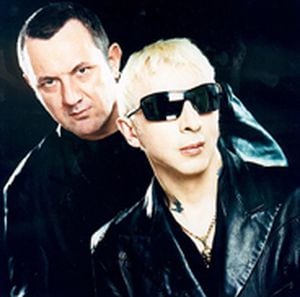
Both men have enjoyed extensive, varied and successful solo careers away from Soft Cell, but their new album is distinctly Soft Cell, rather than a solo release from Dave or Marc.
Almond says: “It's just the recipe and the chemistry. Hard to define really. I’ve sung over other electronic tracks, but Dave's music has a great cinematic feel and pop sensibility. Its dark and threatening at times, but with a sleazy naughtiness too.
"There’s nothing like it. It has humour too. Dave and I are as different as chalk and cheese, but we do share a darkly sardonic sense of humour and our tastes in music, though different, in some ways do overlap in enough ways.
"Ever since I heard Donna Summer sing over Giorgio Moroder’s cold ethereal electronic backing track of ‘I Feel Love’ I realised that there’s a great recipe with an emotive singer mixed with cold electronics. Soft Cell try to get a bit of that – electronic pop and soulful songs with a happiness on the surface, but a bitterness underneath. Like salted caramel.”
Ball adds: “We never worked in the studio together at all during the recording. We used to write like that back in the 80s – I would give Marc cassettes of my demos, he would go away to write the lyrics alone and then we’d get together and combine our efforts.
"Writing in isolation has always been quite normal for us. As for the lyrical subject matter, you’ll have to ask Marc as he wrote them all. I just provided the background.
"I always think of Soft Cell’s modus operandi in a cinematic way – I write the score and Marc writes the script.
"Both Marc and I have worked on many other projects outside the Soft Cell umbrella as I think we both enjoy collaborating with other artists. My main other band is The Grid, which is still an active unit – in fact there is a Grid remix of the forthcoming Soft Cell single. Depending on who I’m working with I’ll adjust my approach accordingly so, if I’m doing solo ambient stuff, I’ll work differently to working with The Grid. Likewise, if I’m working with Marc, I’ll put my Soft Cell hat on, which means I will have a set of parameters that are specific to us – certain sounds and chords that comprise our sound. Like a signature I suppose.”

